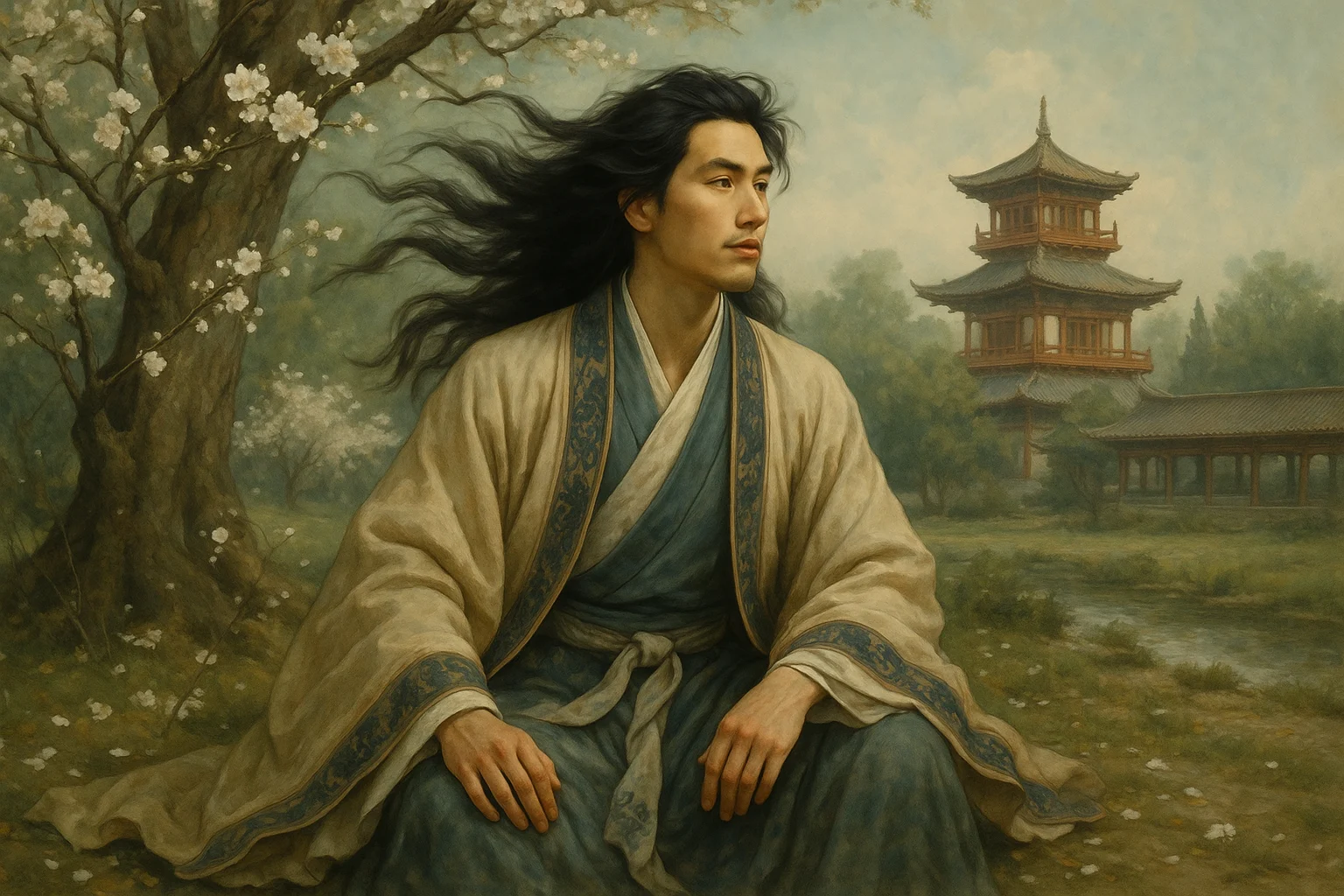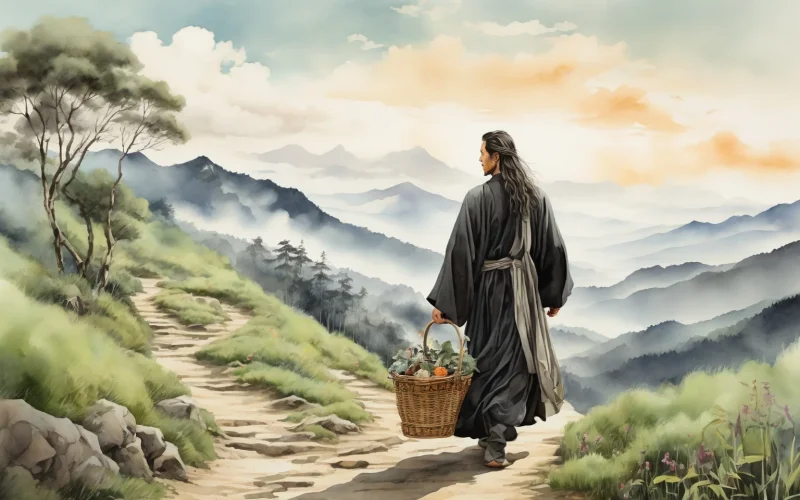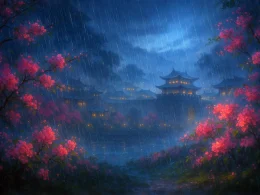Gathering herbs on three peaks done,
You ride the wind—home in five suns.
Lotus leaves stitch your hut’s old frame,
Pounded barks dye robes with new flame.
Jade-like grains your fingers know,
Cinnabar’s truth your tests will show.
Watching green bamboo joints extend,
You’ll chase white clouds where transcendence never ends.
Original Poem
「赠张道者」
韩翃
采药三山罢,乘风五日归。
翦荷成旧屋,剉蘖染新衣。
玉粒指应久,丹砂验不微。
坐看青节引,要与白云飞。
Interpretation
This poem was composed by Han Hong upon bidding farewell to Daoist Zhang, a practitioner of Taoism. During the Tang Dynasty, Taoist culture flourished, with many adherents retreating to mountains to refine elixirs and pursue transcendent ideals. Through parting with Daoist Zhang, the poet expresses admiration for the Taoist way of life while reflecting on his own detachment from worldly gains and spiritual aspirations.
First Couplet: "采药三山罢,乘风五日归。"
Cǎi yào sān shān bà, chéng fēng wǔ rì guī.
Gathering herbs across the Three Sacred Peaks, his task complete,
He rides the five-day winds back to his abode.
This couplet opens with action, marking the end of Daoist Zhang’s journey to the legendary Three Peaks (Penglai, Fangzhang, and Yingzhou) where immortals dwell. "Riding the winds" (乘风) not only describes his swift return but also evokes the mystical imagery of Taoist transcendence, suggesting an almost celestial ease of movement. "Five days" may refer to an auspicious period or simply emphasize the Daoist’s unfettered, unpredictable comings and goings. The ethereal tone sets the stage for the figure’s otherworldly aura.
Second Couplet: "翦荷成旧屋,剉蘖染新衣。"
Jiǎn hé chéng jiù wū, cuò niè rǎn xīn yī.
Trimming lotus leaves to thatch his humble hut,
Grinding roots to dye his simple robes anew.
Here, the poem shifts to depict the Daoist’s rustic life upon returning. "Trimming lotus" and "grinding roots" illustrate his self-sufficient harmony with nature. Though his dwelling is "humble" (旧屋) and his robes "simple" (新衣), they embody contentment—a quiet critique of worldly extravagance. The understated language paints an idyllic, ascetic existence, celebrating the purity of Taoist detachment.
Third Couplet: "玉粒指应久,丹砂验不微。"
Yù lì zhǐ yīng jiǔ, dān shā yàn bù wēi.
The jade-like elixir grains in his hand promise lasting power;
The cinnabar’s potency proves no trifling feat.
This couplet delves into Taoist alchemy. "Jade-like elixir" (玉粒) and "cinnabar" (丹砂) symbolize both physical and spiritual refinement. "Lasting power" (应久) and "no trifling feat" (不微) underscore the efficacy and profundity of his craft. The measured diction conveys reverence for the Daoist’s skill, aligning with ancient ideals of achieving immortality through discipline. The lines elevate the poem’s philosophical depth.
Fourth Couplet: "坐看青节引,要与白云飞。"
Zuò kàn qīng jié yǐn, yào yǔ bái yún fēi.
Seated, he watches bamboo joints stretch skyward—
His spirit yearns to soar with white clouds.
The climactic couplet merges observation with transcendence. "Bamboo joints" (青节) symbolize resilience and moral integrity, while "white clouds" (白云) represent the ultimate Taoist freedom. "Seated" (坐看) captures meditative stillness, yet his heart "yearns to soar" (要与飞), aspiring to unbounded spiritual liberation. Through the Daoist’s example, the poet voices his own longing for detachment and inner peace, leaving the poem to resonate with ethereal longing.
Holistic Appreciation
The poem appears deceptively simple, yet flows like a clear spring with profound depth. Rather than directly praising the Taoist's noble character, the poet paints his life through subtle details—gathering herbs, refining elixirs, his humble dwelling, and plain robes—revealing a harmony with nature and detachment from worldly pursuits. Blending realism and mysticism, the poem portrays the Taoist as both grounded and transcendent, embodying serenity, freedom, and spiritual elevation. Scenes resonate with emotion, and imagery carries philosophy, leaving readers refreshed as if touched by a mountain breeze.
Artistic Merits
- Microcosmic Grandeur: Eschewing grandiose claims, the poem focuses on minutiae like "trimming lotus roots" and "grinding medicinal herbs," rendering the Taoist vividly tangible.
- Ethereal Imagery, Elevated Tone: Symbols such as "verdant bamboo," "white clouds," "cinnabar," and "jade-like grains" craft an ethereal, otherworldly aura, elevating the poem beyond mundane concerns.
- Fusion of Scene and Thought: It balances realistic depictions of mountain solitude with whimsical fantasies—riding the wind home, clouds yearning to fly—merging the tangible and the abstract with Taoist wisdom.
- Concise Language, Fluid Rhythm: Economical yet melodic, the verses transition seamlessly between stanzas, marrying imagery and introspection in a cadence that lingers.
Insights
True freedom lies not in physical escape but in inner tranquility. Amid modern clamor, the Taoist’s posture—"sitting with bamboo" or "drifting with clouds"—invites us to seek alignment with nature and self-acceptance. This ideal of "withdrawal" transcends ancient hermits, offering a timeless blueprint for nurturing peace in a chaotic world. A poetic life needs no grandeur; it thrives in simplicity, clarity, and clarity of spirit.
About the Poet

Han Hong(韩翃), a native of Nanyang, Henan, was one of the "Ten Literary Masters of the Dali era" (大历十才子). He was renowned for his poetry, particularly farewell and parting verses, which gained significant acclaim during his time. The Complete Tang Poems (《全唐诗》) preserves three volumes of his works.











